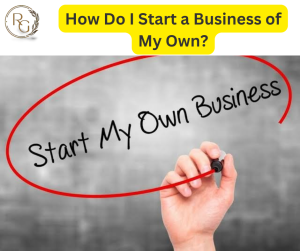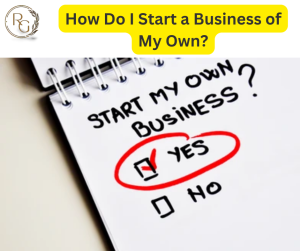How Do I Start a Business of My Own?
Before you can start a business, you must decide what you will be doing and how much money you will need. Passion alone is not enough to run a successful business. Before starting a business, you must analyze your strengths and weaknesses and do a SWOT analysis.
If you’re passionate about something to start a business, that’s great, but you may not be able to execute your idea properly to start a business.

Here are some tips for getting started in business:
Choosing the right business structure
If you want to start a business of your own, one of the first decisions you’ll need to make is what type of business structure to use.
The structure you choose will have significant implications on your business, including what type of tax returns you’ll need to file and the applications you need to make. It will also depend on your vision, the level of control you’d like to have, and how you plan to invest your earnings.
There are many options available when it comes to legal structure for a new business. Depending on the type of business you want to start, you can choose from sole proprietorships, partnership businesses, and corporations.

Pros and Cons to start a business
Each option has its pros and cons, and choosing the right one depends on your situation, long-term goals, and preferences. However, a sole proprietor is the most common type of business structure.
When you start a business yourself, it is important to choose the right legal structure. This is important because it will determine how your business will be taxed, how much paperwork you have to do, and how you can raise money.
Therefore, you should not take this decision lightly and instead, seek sound advice from experts in the field. As long as you understand your goals and can find a structure that suits them, your company will be successful.
There are also benefits to both types of business structures.
A single-owner LLC, for example, does not pay federal taxes. Instead, shareholders receive distributions according to their investments. However, a sole proprietorship cannot go public.
A partnership, on the other hand, may be the most tax-efficient choice. The main difference between a sole proprietorship and a corporation is whether it’s best for your particular type of business.
The type of ownership structure you choose for your business is very important and should depend on the products or services you’ll be providing.
If your business is riskier, you should form an entity with limited liability, which protects you from personal claims and debts related to the business. Choose between a corporation and a limited liability company depending on your business type. You may want to choose a corporation if you plan to hire employees or have a high liability.
Generally, an incorporated business is more mature than a startup, and it is recommended for more established companies with many employees or those that plan on raising a lot of capital through stock sales.
Incorporating your business allows you to maximize tax benefits, but you have to bear more risk than a sole owner. You may even want to file as an S corporation, if only for tax reasons.
Finding funding
Despite the many options for startup financing, there are a few ways to go about it. These include crowdfunding platforms, which allow individuals and small businesses to raise money from strangers.
Although crowdsourcing platforms are not risky-, they do help startups in their early stages. And while they may be difficult to qualify for, the money they raise will be crucial to the growth of their business. However, obtaining startup funding is not impossible, so don’t let that stop you.
Another way to secure startup funding is to seek out family and friends for personal funds. This method is a classic option for small businesses but can be difficult to convince banks and investors.
Although you can tap into family and friends for this, having a solid business plan is essential as knowing there’s a market for your product. You should also have a plan in place for paying the interest on borrowed money.
best way to raise money to start a business
The best way to raise money for your new venture is to find high-net-worth individuals who will syndicate up to $1 million for qualified startups.
The best way to find these individuals is to network with local people and check out crowdfunding websites such as Kickstarter. These crowdfunding sites allow people to pledge funds to start up projects and get rewards in return.
It’s an excellent way to raise capital for your startup without having to spend all of your personal assets.
A small business owner’s personal credit score should be checked. If it is low, it may be a good idea to consider a business credit card. It helps build the business credit while boosting the personal credit score at the same time.
By paying off the balance on the card, you’re also increasing your personal credit score. That will help you when you start to apply for financing for your startup. However, this method requires a business plan and projections of profits.
When starting a business yourself, you can seek startup capital from a small business accelerator program. The best way to get started with small capital is to find a good partner or investor to help you scale to start a business.
Start small and then expand when you have enough cash flow. Often, a small business can grow into a large one if it’s properly funded.
However, scaling a business is harder than you think, and it requires a solid business plan and a lot more money.

